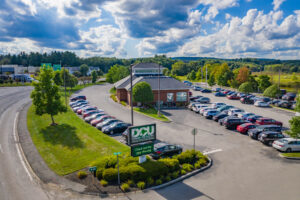By Debbie Spingarn, Contributing Writer

Photo/Submitted
REGION – If you’re tired of high banking fees, long telephone hold times and poor customer service, maybe your current “big” bank isn’t meeting your needs. Older consumers who remember the days of a more personalized banking experience may be particularly interested in the approach and services offered by one of the Bay State’s roughly 150 credit unions. Massachusetts credit unions have a total of 3.16 million members with over $46.95 billion in assets.
Non-profit financial cooperatives owned and operated by members
According to Ed Niser, assistant public relations manager at DCU (Digital Federal Credit Union), which has its headquarters in Marlborough, credit unions were founded on the “people helping people” principle. They are able to offer higher interest deposit accounts, loans with better rates, and services for free or at a reduced cost. “DCU understands that every member’s goals are unique regardless of what age they may be,” he said. “That’s why we take the time to get to know our members and understand what their short-and-long-term financial goals are so we can help them reach those goals.”
Another credit union manager, Andrew Minton of Members Plus Credit Union, with offices in Norwood and around Greater Boston, believes that in a sense, members do help shape the credit union’s policies. “All of our policies must be approved by the board of directors, which is made of existing members who volunteer their time,” he said.

Photo/Submitted
George Mullen, 63, of Norton, just amended an auto loan at DCU for an interest rate of 1.99 percent, down from 4.24 percent. This saved him $42 a month in interest fees, he noted. “DCU also pays 6.17 percent interest on the first $1,000 in a savings account,” he added. “As well, your employer deposits get credited to your account a day earlier than the big banks.”
Emphasis on customer service
Credit unions pride themselves on excellent customer service and offer in-person appointments and a focus on people rather than profit-making goals of the competitor big banks. “As non-profits, we put our emphasis on people, understanding that our members are why we are here,” said Minton. “When I worked for larger banks the focus was very much on product goals and maximizing profits.” Older consumers may also be less tech-savvy or prefer face-to-face interaction and find a credit union a better fit for them.
Consumers who need help with credit
In addition to great customer service, credit unions offer novel ways to gain access to credit or improve poor credit. One product, the secured credit card, is offered as a good way for an individual to establish or build their credit. “DCU’s Visa Platinum secured credit card was recognized by CNBC as the ‘Best Secured Credit Card with Low Interest,’” noted Niser. “CNBC Select lauded the card for having one of the lowest interest rates in the country as compared to other secured credit cards that often have interest rates upwards of 20 percent. The way the card works is it borrows against the member-described savings account, not primary savings,” he explained. “The funds deposited into the account will equal that of the credit line agreed upon at the time of application.”
Big banks or credit unions?
The decision to try a credit union might be simply knowing that they exist and doing research to figure out your financial needs. Big banks often don’t offer secured credit cards, some types of loans or interest on savings accounts. Standard credit cards have specific income and employment requirements. Credit unions have their own ATMs, but customers can access their accounts in non-credit-union ATMs for a fee. Despite big banks’ advertising, the many other advantages of a credit union can often outweigh location.
RELATED CONTENT:
Estate planning for pets ensures your wishes are honored (fiftyplusadvocate.com)
Massachusetts seniors may be eligible for circuit breaker tax credit (fiftyplusadvocate.com)












